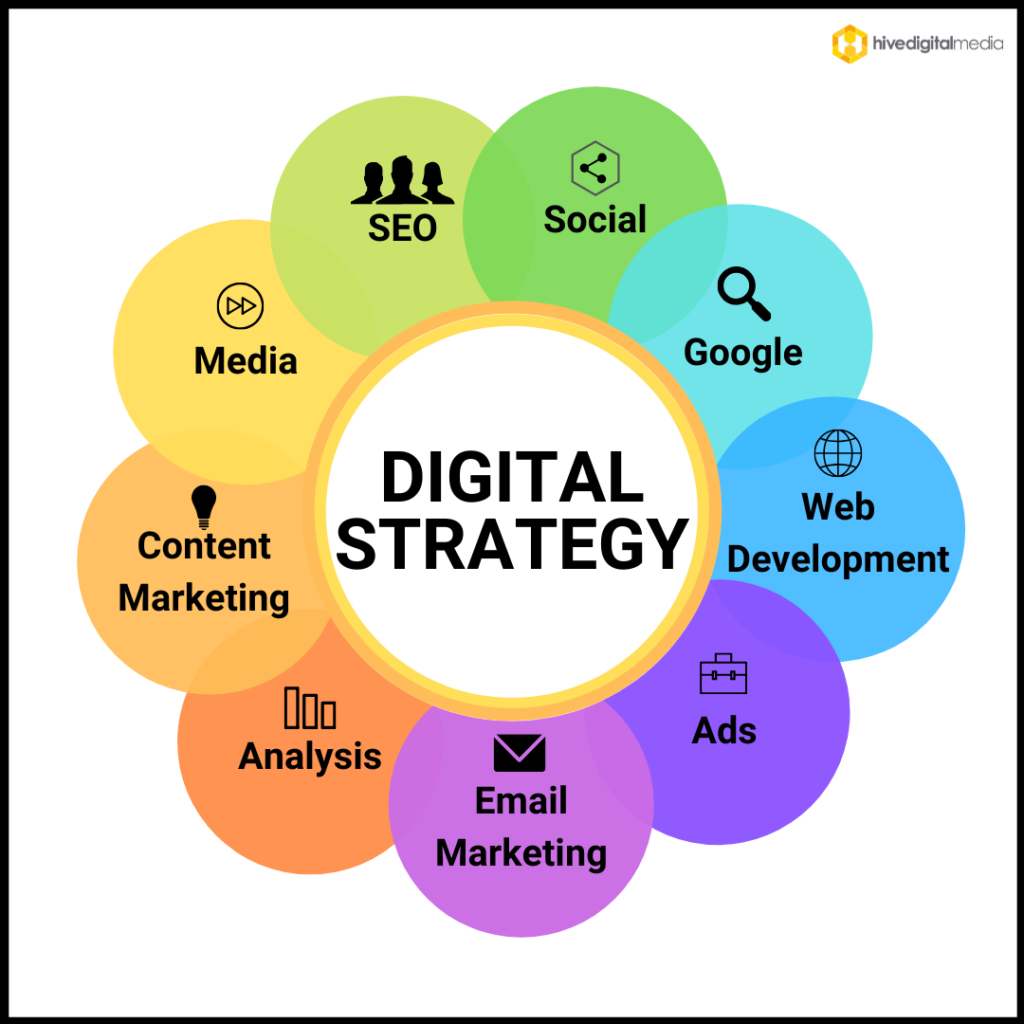Digital Strategy
What is Digital Strategy?

Definition:
Digital Strategy Development refers to the comprehensive planning, execution, and management of an organization’s use of digital technologies and channels to achieve its business objectives. It involves leveraging digital tools, platforms, and methodologies strategically to enhance operations, reach target audiences, and stay competitive in the digital landscape. Digital s trategy encompasses a wide range of activities, including online marketing, web development, data analytics, and the integration of digital technologies into various aspects of business processes.
Analogy:
Consider digital strategy as the navigation system of a ship. Just as a navigation system guides a ship through the vast and dynamic ocean, digital strategy navigates an organization through the complex and ever-changing digital landscape, helping it reach its destination by utilizing the right technologies and channels.
Further Description:
Digital strategy development involves several key components:
Business Objectives Alignment: Aligning digital initiatives with overall business goals ensures that digital strategies contribute directly to the organization’s success. This includes understanding how digital technologies can support revenue generation, customer engagement, and operational efficiency.
Audience Segmentation and Targeting: Like in content strategy, understanding the target audience is crucial in digital strategy. It involves segmentation, profiling, and targeting specific audience groups to tailor digital efforts effectively.
Digital Channels Selection: Identifying and selecting the most relevant digital channels is a critical aspect of digital strategy. This may include social media, email marketing, search engine optimization (SEO), online advertising, and other channels based on the target audience and business goals.
Technology Integration: Digital strategy often involves integrating various digital technologies into the organization’s operations. This can include implementing customer relationship management (CRM) systems, data analytics tools, e-commerce platforms, and other technologies that enhance efficiency and effectiveness.
Data-driven Decision Making: Utilizing data analytics to gather insights and make informed decisions is a key element of digital strategy. This involves measuring and analyzing data from various digital activities to refine strategies and improve performance.
User Experience (UX) Design: Creating a positive user experience is crucial in the digital realm. Digital strategy includes considerations for website and app design, ensuring that users can navigate seamlessly and have a positive interaction with the brand online.
Security and Compliance: Addressing digital security and compliance with regulations is paramount. Digital strategies should include measures to protect user data, ensure privacy, and comply with relevant laws and standards.
Why is Digital Strategy Development Important?
Competitive Advantage: A well-crafted digital strategy provides a competitive edge by leveraging digital tools to reach audiences more effectively and efficiently than competitors.
Scalability and Flexibility: Digital strategies allow organizations to scale their operations and adapt quickly to changes in the business environment, market trends, and consumer behavior.
Cost Efficiency: Efficient use of digital tools can lead to cost savings in various aspects of operations, marketing, and customer engagement.
Data-driven Insights: Digital strategies leverage data analytics to gain valuable insights into customer behavior, preferences, and market trends, enabling informed decision-making.
Global Reach: Digital platforms facilitate global reach, allowing organizations to connect with audiences worldwide, breaking down geographical barriers.
Examples and Usage:
Amazon: Amazon’s digital strategy involves leveraging e-commerce, cloud computing, and data analytics to provide a seamless shopping experience for customers. Their use of personalization and recommendation algorithms demonstrates a data-driven approach to enhance user engagement.
Nike: Nike’s digital strategy includes a strong online presence, mobile apps, and social media engagement. They utilize digital channels not only for marketing but also for creating a community around their brand.
Netflix: Netflix’s digital strategy focuses on streaming content, personalized recommendations, and original content production. They use data analytics to understand viewer preferences and provide a customized entertainment experience.
Key Takeaways
- Align digital initiatives with overall business goals to ensure a direct contribution to organizational success.
- Understand and segment the target audience to tailor digital efforts effectively.
- Select and leverage relevant digital channels, such as social media, email marketing, and SEO, based on the target audience and business goals.
- Integrate digital technologies into operations for enhanced efficiency and effectiveness.
- Utilize data analytics for informed decision-making and continuous improvement.
- Prioritize user experience (UX) design to create a positive and seamless interaction with the brand online.
- Address digital security and compliance to protect user data and ensure regulatory adherence.




